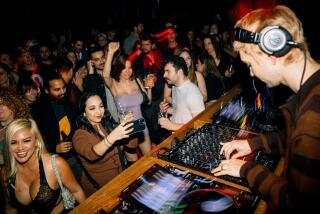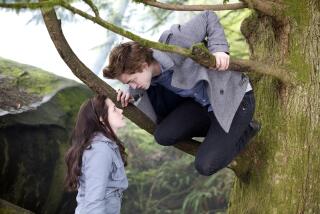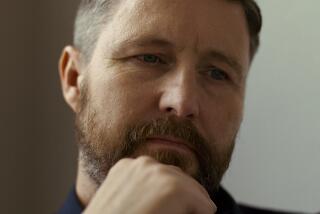Gay life celebrated in avant-garde films at the Egyptian
The love story in Penelope Spheeris’ “I Don’t Know” is more than boy-meets-girl. The 18-minute black-and-white short shot in 1972 starts in an elevator where a lesbian meets a transgender man and the two become lovers (then exes) while French music plays.
These are the sort of expectation-defying stories that will be told with “Same Sex/Different Sex: Queer Identity and Culture,” part of the Filmforum’s Alternative Projections exploring experimental film in Los Angeles. Spheeris, whose later directoral credits include the era-defining “Wayne’s World” and the 1981 punk documentary “The Decline of Western Civilization,” shot “I Don’t Know” while in film school at UCLA. She cast her lesbian sister as the female lead and Jimmy (also known as Jennifer) as her unconventional love interest.
“I always dealt with off-the-beaten-path subject matters,” Spheeris said of the short, which will be featured in the collection of rarely seen short films presented by the Los Angeles Filmforum and Outfest on Sunday night at the Egyptian’s Spielberg Theatre. “And I happened to be friends with a couple of very fun and colorful drag queens — Jennifer was the beautiful one.”
The program opens with the premiere of a recently restored Robert Chatterton film, “Passion in a Seaside Slum,” which was shot in Venice Beach in 1961. Taylor Mead, who appeared in several of Andy Warhol’s underground films, makes a rare West Coast cameo playing the lead role — known only as a derogatory (and unprintable) term. The 32-minute film shows Mead using a magic wand to morph into various drag dress to woo a fisherman with amusing results.
“The films are realistic depictions and joyful depictions of gay characters,” said Adam Hyman, executive director of the Los Angeles Filmforum, who curated the show. “You can really see culture changes in freedom and sexuality that was prominent in the ‘70s in the queer community that we know changed in the ‘80s.”
The most recent short in “Same Sex/Different Sex” is from the late 1970s. None of the films during Sunday’s screening address the soon-to-come AIDS epidemic. “It’s kind of a natural cutoff,” said Kristin Pepe of Outfest, a film festival and nonprofit that works to preserve lesbian, gay, bisexual and transgender films. “There was so much fear in the early ‘80s that [LGBT] films in the mid-’80s were wrestling with emotions and the government. People started banding together in a different way.”
Other avant-garde works include Chick Strand’s “Fever Dream,” a stylized view of a lesbian coupling, and Kenneth Anger’s “Kustom Kar Kommandos,” a suggestive three-minute short of a young man buffing a hot rod to the tune of “Dream Lover.”
The fiction and fantasy of “Same Sex/Different Sex” are spliced with a series of one-minute public service announcements circa the 1970s with gay and straight women introducing their vocation and sexuality to portray lesbians “as just regular folks,” Hyman said.
One of Pat Rocco’s little-known shorts will also be on the playlist. The filmmaker started his career shooting men posing nude and moved into documenting the gay civil rights movements in the late ‘60s and early ‘70s. “He also made experimental films,” said Pepe. “I hope we’ll get his name in the canon that he’s less known for.”
Filmforum’s Alternative Projections series will have screened some 30 shows by the time it wraps its seven-month run in May, with topics that include politics and punk shot by Los Angeles artists from 1945 to 1980 — a timeframe that becomes particularly potent when applied to sexual freedom.
Through the ‘60s these sorts of film screenings were mostly kept to small, closeted affairs. Theater programmers in Los Angeles were arrested for showing obscene works, including an exhibitor who in 1964 screened Anger’s “Scorpio Rising.” The conviction was later overturned in Los Angeles County Superior Court.
“Up to the ‘70s, the primary thing for gay people to do was hide,” said Hyman. “You didn’t want to discuss it; you wanted to get along in mainstream society.”
Around 1970, the momentum shifted. “People got really brave and started making films and having these screenings,” Pepe said. “Film is a very important vehicle for social change ... and having people come together to show images of themselves was really crucial. These are really the early heroes of the gay rights movement.”
Same Sex/Different Sex: Queer Identity and Culture
Where: Spielberg Theatre at the Egyptian, 6712 Hollywood Blvd., Los Angeles
When: 7:30 p.m. Sunday
Price: Free, reservation required
Info: 213-386-8482, https://www.alternativeprojections.com
More to Read
The biggest entertainment stories
Get our big stories about Hollywood, film, television, music, arts, culture and more right in your inbox as soon as they publish.
You may occasionally receive promotional content from the Los Angeles Times.






